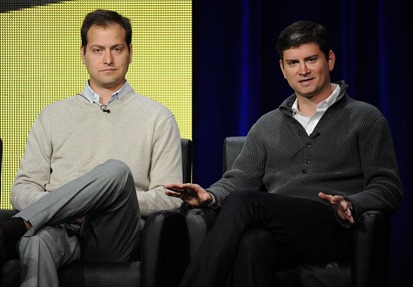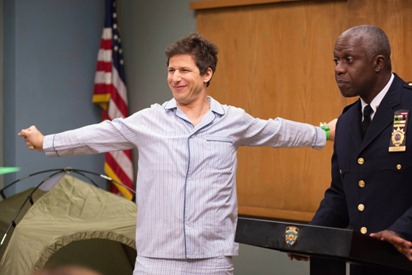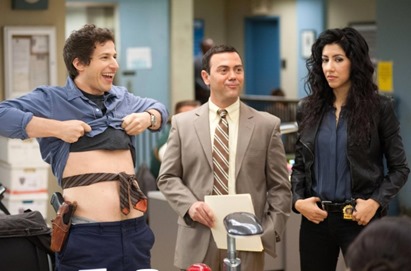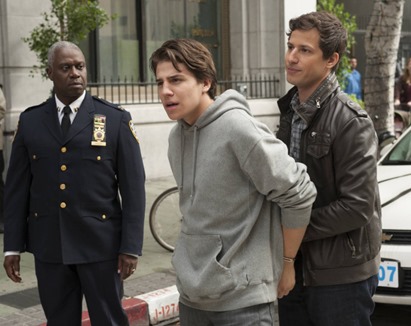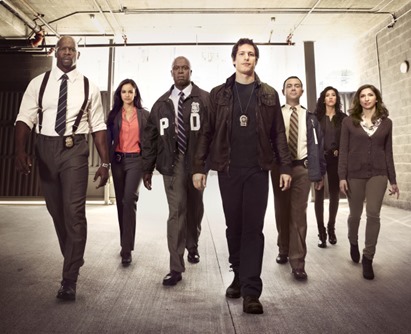Fox’s Brooklyn Nine-Nine (Tuesdays, 8:30/7:30C) is the best of the fall’s new half-hour comedies. It’s a combination procedural/workplace comedy set in the Brooklyn Nine-Nine – a precinct where the best detective is an immature prankster who behaves like the class clown in high school – and the precinct’s new captain is a by-the-book hardass who is also a mostly happily married gay man.
Series creators Mike Schur and Dan Goor and star Andy Samberg (hint: he’s not the new captain) talk about setting a comedy series in a genre that hasn’t been terribly successful since the days of Barney Miller.
I wanted to ask pretty much everybody if you could weigh in on what was it about the cops genre that you wanted to kind of focus on for a sitcom because you could have probably chosen anything but a cop genre is … right for comedy.
Mike Schur: When Dan and I first started thinking of ideas for shows, we started talking about the idea of doing a cop comedy, and we pretty quickly realized that there hadn’t been a half hour cop comedy in a while, and that, in this day and age where there is 10 million shows about every genre, every setting, every location that is possibly imaginable by the human brain, that made it seem like kind of an exciting challenge. And we were both fans of Barney Miller and we have fond memories of Barney Miller, and just the more we talked about it the more it seemed like something that, at least in the half hour network comedy world was at least somewhat unexplored territory, I guess. As soon as we came to that conclusion and we started talking about it, we just liked the idea more and more and we kind of stuck with it.
Andy, what do you think about the cop genre? What was it that appealed to you?
Andy Samberg: Well, I definitely was going to get to wear a cool leather jacket, which was appealing, and honestly, I’ve always enjoyed cop comedies as well as cop dramas as well as cop films and T.V. I like the procedural aspect of it, and I also really like the work place aspect of it. When it comes to work place comedies there is really no one else I would want to work with than these dudes.
Dan Goor: We also really like the world because we thought it was a cool way to have interesting characters, both in the police department and in terms of the people that they interact with, so that it’s an interesting subsection of humanity that cops get to deal with.
I’m wondering though, each week does Andre Braugher get to ask, “What’s wrong with you?” a variation of that of Andy Samberg.
Schur: Yes. The answer is yes. Most of the episodes involve Andy’s character, Jake Peralta, doing something which requires Andre Braugher’s character to say some version of, “What the hell is wrong with you?” That’s a pretty constant theme. For example, right now, during this conference call Andy is eating a giant bag of beef jerky. I think if Captain Holt were here he would be staring blank faced at Andy and saying, “What is wrong with you?”
Samberg: “Peralta, that’s way too much sodium for you.” Not to mention…
The reason I ask though is can Andy’s character make much—how much can you change him without sort of upsetting the balance between the two characters?
Schur: Well, it’s a good question. It’s one we talk a lot about in the writing room, and I think that the central tension of the show comes from the fact that Jake doesn’t really want to be changed that much and Holt really wants to change him and they butt heads a lot. That will be the dynamic that’s set up in the pilot is that Holt is a guy who wants to make the best precinct in Brooklyn. Jake is his most talented detective but he also doesn’t really do things the same way the Holt does, and that is a source of constant irritation and annoyance. Because as long as Jake is closing cases, which he does because he is good, he has a leg to stand on in terms of the way he conducts himself. That dynamic is the central dynamic intention in the show.
How is working on Nine-Nine better and different than working on SNL?
Schur: He can’t answer you because his mouth is full of beef jerky. I’m not kidding.
He has to … the beef jerky and answer me.
Samberg: I wasn’t expecting to be asked a question. It’s better in that, for me any way, it’s much less stressful because the hardest part of SNL, for me, was having to create something new every week. And with this I have, basically just scripts handed to me every week that are already great and a bunch of jokes that are already written, which is the hardest part of comedy, in my opinion. So in that regard it’s been a lot less stressful for me.
Certainly, the hardest part changing has been waking up early versus staying up incredibly late with SNL, which is much more my element, but I’m adjusting nicely. And I say that with full confidence knowing you can’t see the other two’s eyes rolling as I say it.
Is there any advice that someone at SNL gave you that you’re using now for your new character in Nine-Nine.
Samberg: No, but I will say that I took a cue from Amy Poehler in terms of feeling confident about making this decision. Not just because she seg’d successfully out of the show into a show, but because she literally did it with the same guys.
Was seg short for segue?
Samberg: Seg was a shortening of the word Segway, yeah. And by that I meant she rode a Segway out of 30 Rock, all the way to Los Angeles and onto the CBS … Parks and Rec. Stay tuned for the documentary.
This question is for all of y’all. I imagine growing up that y’all watched a lot of cop television shows and movies. Andy you probably went through a lot of training to prepare to play Jake, and Mike and Dan I bet you had to do some research to write for the show. Taking all of that into consideration along with the first day versus the latest episode that you all shot, how has your perspective of being a cop changed?
Goor: Well, we’ve dealt a lot with – Sorry, this is Dan speaking. Depending on whether or not you like the answer to this, in which case if you don’t, it’s Mike. We have some great technical advisors and I think— it’s funny. When we’re pitching stories and trying to come up with funny and interesting things for Jake and the other characters to go through, sometimes we’ll pitch something really crazy or dangerous or outlandish and every single time the technical advisors are like, “Yeah, I’ve done that. I’ve done worse. I’ve seen worse. I’ve seen tougher.” And, I think, over the process we already had a tremendous amount of respect for police officers in general, but we’ve, I think, gained even more respect and are sort of of drop-jawed at the sort of things that these guys have been through.
What’s your opinion about the future in comedy or do you think some situational comedy going to win over high-brow intellectual comedy writing.
Schur: I think that there is often kind of lines of demarcation drawn by different people about comedy and what types of comedy there are and whether this type of comedy is better than that type of comedy. But I kind of feel, personally, like it’s a really big country and a big world and there are like 7,000 stations making original programing right now, and that comedy is the most subjective art form in the world, I think. There is no other art form where one group of people can look at something and say that’s the most brilliant thing I’ve ever seen in my life and another group of people can look at it and say, that is the stupidest thing I’ve ever seen in my life. I hate it.
That’s what makes comedy great is that there is room for everybody. No matter what you like in the world right now, no matter what flavor you like your comedy there is a 100 shows that are making that kind of comedy. So I think the future of comedy is that there is going to be a lot of it, and as a comedy writer, I wholeheartedly approve of that future. And what’s fun about it is you get to make whatever you think is good, assuming that enough people watch it to keep it on the air, and you just get to put it out there and see who likes it.
Michael actually just mentioned something that I was kind of curious about. I’ve watched every single new pilot for the upcoming season and there is a lot of—what’s the politically correct word—quality of the comedies are very low. Yours is probably my favorite show. I’m not just blowing smoke here, but my favorite show, overall, that I have watched of the 43 new pilots that I have seen. Why is it so difficult—and you could all weigh in on this. Why is it so difficult to make a quality sitcom that doesn’t just appeal to the lowest common denominator?
Schur: Well, comedy is hard. As I think Henny Youngman once said, in general, but comedy pilots are almost impossible. It’s really, really hard to make a good comedy pilot, and partly that is because characters aren’t funny until you know who they are. And comedy pilots are trying in 20 minutes to introduce you to people, to explain who there are, where they are, what they are doing, what they like and don’t like, what their motivations are, their dreams, their hopes, their desires, their fears, and then make a bunch of jokes about those things and it is just really hard.
And I think that over the last 30 years there’s the story that emerges constantly which is, show X was the lowest rated, lowest testing pilot in the history of the universe and then look it became an amazing show. And that is true of Cheers and it’s true of Seinfeld and it’s true of The Office. I think that it’s not at all surprising. It’s because it’s very, very hard to find people funny before you know who they are.
So I think that if you make a good pilot, it’s because you have a good idea and you have a great cast and you have great directors and editors and you’re able to capture a snap shot of hopefully what the show will be someday in an enticing way that has a bunch of good jokes in it. But it’s just impossible to flesh out. We have 7 full-time cast members on the show and several others that are recurring and stuff like that and it’s just impossible for any show to fully develop 9 or 10 people in 20 minutes. It’s really like it has to be thought of as Chapter 1 of a novel and not of a kind of a movie that you can evaluate on its own without any context or anything or without thinking of it as the beginning of something. It’s just a very difficult task.
I think our pilot wouldn’t be nearly as good as it is if we hadn’t gotten Andy and Andre Braugher and Terry Crews and Chelsea Peretti and Stephanie and Melissa and Joe. It’s an amazing cast. And I think that the fact that the pilot reads as a quality product to you, if it does, is largely because of how good they are and how funny they are.
Goor: I think, also, the first five minutes of a pilot, especially a comedy pilot, there is so much pressure to make every line funny and, again, as Mike said, that’s before you know any of the characters. And so, we, I think, had a tremendous leg up because people love and know Andy. And so the first shot of the episode is his face and it’s sort of a short cut that we get to take where people know at least who the actor is and they’re inclined to laugh. You’re not just seeing a random person who then has to say a kind of crazy thing to make you laugh because you have no idea who they are, what the context is in which they are speaking, or anything else about the show.
You mentioned you had Andy who is a recognizable person for most people because of his work on SNL and different films. Because you had such a great pilot— I loved the pilot. And it’s funny you mentioned that the first three minutes I was laughing more than I had in a lot of the other comedy pilots that I watched. You really had my attention. I know some pilots they take a rough starting point. For you guys, you didn’t have that. So how do you maintain the momentum of having such a good pilot when other shows, sometimes they start slow and they gradually build, but from my perspective you guys started really strong. How do you maintain that over the course of the show?
Schur: Cocaine. We do a lot of cocaine.
Samberg: You’ve given voice to my every anxiety.
Schur: Well, you trust in the cast and you trust in the directors and you trust in the writing staff. If you worry about things like are we maintaining our momentum, then you are kind of dead because the only thing that you can control as you go along in a T.V. show that requires possibly 22 or more episodes in a year is is this one good? And as long as you can say, “Alright, this one’s good, move onto the next one,” that’s enough of your time to be taken up. And if you start worrying about anything else, any peripheral issue or sort of metaphysical issue about momentum or the zeitgeist or the nature of the shifting sands of comedy in the universe or something, you’re just going to spiral until you collapse into a puddle.
So all we do is we focus on what’s in front of us and that’s currently we’re shooting episode 5 and we’re prepping episode 6 and we’re re-writing episode 7. We just come into work everyday and we put our heads down, and we try to make every script as good as it can be. And we just trust that the creative team, the cast and the director, and the editors are all going to do a great job and make it good.
Samberg: And, by the way, if we’re lucky enough that everyone agrees with you and enjoys the pilot enough that we’re worried about losing momentum from the pilot, we’re in really great shape and we’ll consider ourselves happy.
I enjoyed the show, and in tribute to you guys, I am sitting here wearing a tie as a thong. And my question for Andy, now that you’ve had some experience playing a police detective, if we were to drive you to a real cop shop or to a crime scene, gave you a prop gun, and a badge, how long do you suppose you could fake it without being found out as a fraud?
Samberg: Well, it depends on if it’s an area near any college kids because that’s who recognizes me the most from SNL. But assuming no one had ever seen me anywhere else…. I would say maybe 30 seconds.
Okay.
Samberg: Not that I’m not taking it seriously, but I don’t want to belittle how much training and how much work actual police officers put in to get to a point where they really know what they’re doing. I can pretend like I know how to fly a plane, but we wouldn’t be in the air very long. I know it looks like I don’t know what it actually takes. Let’s put it that way.
It’s fun to see Andre being funny in a cop show. What do you, Andy, think of Andre as an actor and as a person and as a funny actor/person?
Samberg: As an actor, I am completely in awe of him. This is like a Juilliard-trained, Shakespeare in the Park heavy. He knows exactly how to play drama and has so much experience in that regard. So I’m learning from him every day watching how he approaches things and etc.
As a person, I think he’s fantastic. He couldn’t be warmer. It’s been funny because I feel like so many people have this impression of him that he is very intimidating, but I haven’t really seen any of that. He’s been nothing but warm and collaborative and interested and interesting.
And comedically, he gets better everyday but he really started off great, in my opinion. Because of that gravitas that he has and that actual acting training and because that’s so the opposite of where I come from and how I’ve gotten into comedy, I feel like our characters play perfectly into our experience leading up to this point. He’s able to ground scenes and let me sort of act like a maniac all around him like a yipping little dog in a way that has, so far, been really funny. And I think there is no doubt about the fact that he understands comedy wholly and gets the timing of it. Every now and again he’ll ask about the logic of a joke, and often times he’s right to ask and we’ll make an adjustment and it makes it funnier.
So yeah. I think that pretty much covers it. I am all in favor on all three fronts. I think he is awesome.
I’d like you to speak a moment about how you feel about your success starting from SNL, going into the movies, and now you’re a lead character in a terrific sitcom. Tell me how that feels.
Samberg: It feels more and more impossible every time I do something new. When I was 8 years old, I decided I wanted to do SNL and that was pretty much all I thought about until I was actually on it. So everything from the point I got to audition, really, has been icing. I’m incredibly grateful for it all and to be able to have done movies and to have done SNL and now this. It’s so far beyond what I imagined happening for me. I thought that I would probably try and do standup for a while, unsuccessfully, and then get a different job and be sad. Yeah, it feels incredible. I feel incredibly lucky.
Now, you also mentioned earlier that one of the things that you are handed script every week. Is there any room for any spontaneity or any ad-libbing at least, because you are very funny and you do come up with a lot of very good things on your feet; so is there anything incorporated in that?
Samberg: Absolutely, we try and do as many takes as it takes to get as-scripted exactly how we want it, and then we’ll do multiple takes where were we just go for broke and try different stuff. There is always a writer on set and a director-producer on set and that week’s director on set and the whole cast on set, many of whom are trained comedians and writers as well. So even if we’re going off of a scene that’s written, if we feel it’s not totally clicking, we’ll brainstorm and come up with alts and give ourselves as many choices in the editing room as possible.
Goor: I just want to say, Andy frequently has the best joke in an episode. He will come up with it on the set. He’s an incredibly funny performer and writer, and so, thank goodness there is a lot of spontaneity.
Samberg: Well, I am blushing, and eating beef jerky.
Goor: And eating a lot of jerky.
Hey, I just want to ask, how often does Holt being gay come up? Is that something you touch on frequently or not?
Goor: Yeah, it is. I mean, it’s a part of his character. We think of it as a character trait that’s like a guy who’s from Orlando or something. It’s a fact of his life and it has certainly influenced what kind of person he is and the shape that his career has taken, but it doesn’t overwhelm him. It doesn’t define him. It’s not the entirety of who he is.
I think it’s usually mentioned once an episode or something and we have plans in the future to get more into his personal life and possibly meet his partner/husband, but that won’t happen in the first little batch of episodes. We really wanted to focus on the precinct and the work family before we got into the personal lives of the characters.
But he does have a partner?
Goor: Yes, he does and the back story is that he is married.
Schur: Our intention is to treat it much the way that we would treat him having a heterosexual marriage. That being said, it obviously, as you saw in the pilot, it informs his backstory and his perspective, and that is a backstory and a perspective that plays in multiple episodes going forward.
My question is for Andy or all of you. Is Captain Holt testing detective Peralta’s ability to do his job or is he kind of jealous of how smart he is in solving the crimes, and will they ever be happy with each other?
Samberg: I don’t think that he’s testing his ability so much as his potential. He sees that Jake is a good detective with a lot of good instincts, but that he could be a really great one and a leader. And he’s choosing to be lazy and selfish and play in his own lane, and he’s challenging him to be more.
Schur: When Dan and I first started conceiving of the character in the show, we had this character detail for Jake that he was the kind of kid in high school that bragged to his friends and would say, “I didn’t even study for that test and I got a B.” And the idea was that Holt comes along and says, “Hey, you should study and get an A.” That was the essential dynamic of the two characters.
Samberg: Oh my God, I love that.
Sorry, were you going to say something else?
Samberg: I was going to say, I’m finding more and more parallels between Jake and I as the show goes on. He’s based more on me than I realized.
We see some fun scenes in the pilot including Charles’ head being stuffed into ice cream when they’re trying to catch the Serbian thugs. What is it like shooting those type of scenes, and what were some of your favorite scenes or moments to shoot?
Schur: Yeah. That was a really funny moment, and to Joe Lo Truglio’s credit we were doing that scene and he was getting his face smashed in and he was like, “You should just throw me entirely into this gelato cabinet.” By the way, it wasn’t gelato. It’s like Crisco or something that’s like food coloring and stuff cause the actual ice cream was melting so fast. So, he said to the guy playing Ratko, “Yeah, just pick me up and throw me entirely into this gelato cabinet.”
The fun part of the pilot was we decided that the show, because it’s a cop show and it’s a pilot and needed to have some action, and the fun part was coming up with ways that we could shoot legitimate action sequences, even if they were brief, that also had some comedy in them. And shoving Joe Lo Truglio into a giant glass cabinet full of Crisco definitely qualified as one of the more enjoyable moments of the pilot. But, the whole thing was really fun.
Our directors, Phil Lord and Chris Miller, did a great job, and they’re really, really funny guys and they added a lot of great stuff. The whole experience—pilot creation can be a very taxing and trying way to spend your time, but we really had a good experience. It was fun all the way through, which is always, I think, a good sign.
I feel the pressure on for the last question. So, it’s a silly one for Mike. I wanted to know, Mike, if you might ever get a small character on this show, à la Mose from The Office.
Schur: I think should we be fortunate enough for the show to last a long time. Let’s say it lasts 9 years, I think what will happen is that at the very end it will be revealed that this entire thing was a dream in the mind of Mose. Like, the camera will slowly push past as Jake Peralta assumes the captaincy and the command of the Nine-Nine, it will slowly push outside and into a hospital room where a dehydrated Mose will be lying on a cot somewhere, and you’ll realize that this entire thing was happening in a snow globe next to his bed.
Goor: Then they’ll push out further and it will be some fishes …
Samberg: By the way, FOX wanted that to be the way the pilot ended, and we insisted that it could not be.
Schur: Yeah, we laid down the law there. We we’re like, “No, this is not about Mose Schrute. This is about something else entirely.
Photos by Eddy Chen and Beth Dubber/Courtesy Fox
